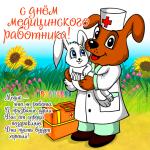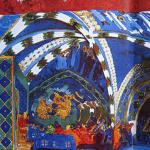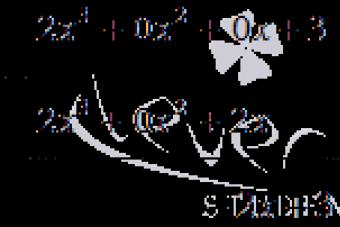Studying the works of A.S. Pushkin, we are increasingly imbued with respect for his literary work. Constant interest in his works makes us dive deeper and deeper into the world of his creations. Everything that belongs to Pushkin’s pen is capacious, beautiful, impressive. His immortal works will be studied by more than one generation of readers.
“Eugene Onegin” is a novel to which Pushkin devoted eight long years. The value of this novel for our cultural and spiritual life is undeniable. The novel was written according to new canons - it is a novel in verse. The novel “Eugene Onegin” is a philosophical, historical novel.
Onegin and Lensky are the two central figures of the novel. In order to understand what these heroes are, to understand the concept of the personality of these people, to penetrate deeper into the author's intention, we will give their comparative characteristics.
Comparative characteristics of the heroes are given according to the following criteria:
upbringing,
education,
character,
ideals,
attitude towards poetry
attitude towards love
attitude to life.
Upbringing
Eugene Onegin. Onegin, by right of birth, belongs to a noble family. Under the leadership of a French tutor, Onegin, “a child of fun and luxury,” was brought up in the spirit of aristocracy, far from truly Russian national foundations.
“At first Madame followed him,
Then Monsieur replaced her...
Lightly scolded for pranks
And he took me for walks in the Summer Garden.”
Vladimir Lensky. A humanly attractive character. Handsome, “shoulder-length black curls,” rich, youthfully enthusiastic and ardent. The author is silent on what ideals Lensky was brought up on.
Education
Eugene Onegin
“We all learned a little, something and somehow,” A.S. Pushkin wisely notes. Onegin was taught in this way “so that the child would not be exhausted.”
Prince P.A. Vyazemsky, a friend of A.S. Pushkin, wrote at one time that according to the canons of that time, insufficiently deep knowledge of the Russian language was allowed, but ignorance of French was not allowed.
“He’s completely French.”
He could express himself and wrote"
What other knowledge did Evgeniy shine with? He was somewhat familiar with classical literature, Roman and Greek. He was interested in history (“from Romulus to the present day”). He had an idea of the social sciences (“he knew how to judge how the state gets rich and how it lives”), political economy (“but he read Adam Smith”).
“A learned fellow, but a pedant:
He had a lucky talent
No coercion in conversation
Touch everything lightly
With the learned air of an expert.”
In general, Onegin can be characterized as an intelligent person, critical of reality, able to weigh the pros and cons.
Vladimir Lensky
"Half-Russian" student at the University of Göttingen. Quite smart, passionate about philosophy (“fan of Kant”) and poetry.
"He's from foggy Germany
He brought the fruits of learning..."
Perhaps he had a bright future, but most likely
"...a poet
The ordinary one was waiting for his destiny.”
Ideals
Eugene Onegin. In order to understand Onegin’s ideals, one must understand the very concept of “ideal.” The ideal is what we strive for. What did Onegin strive for? Towards harmony. Which way did he go? Onegin's path is a struggle between the eternal (national) and the temporary (that which settled in the character of the hero thanks to society and the ideals of someone else's, introduced philosophy).
Vladimir Lensky. Lensky's ideal is eternal love and holy friendship until the grave.
Character
Eugene Onegin. Onegin's character is contradictory and complex, just as his time is complex and contradictory.
What is he like, Onegin?
Onegin is lazy (“which occupied his melancholy laziness all day”), proud, indifferent. He is a hypocrite and a flatterer, eager to slander and criticize. Likes to attract attention and philosophize. At the feast of life, Onegin is superfluous. He clearly stands out from the crowd around him and strives to seek the meaning of life. He's sick of hard work. Boredom, melancholy, loss of direction in life, skepticism are the main signs of “extra people,” which Onegin belongs to.
Vladimir Lensky. Lensky is the complete opposite of Onegin. There is nothing rebellious in Lensky's character.
What is he like, Lensky?
Enthusiastic, freedom-loving, dreamy. He is a romantic, a sincere person, with a pure soul, not spoiled by the light, direct, honest. But Lensky is not ideal. The meaning of life is a mystery to him.
“The purpose of our life is for him
Was a tempting mystery..."
Lensky and Onegin are different. But at the same time, they are similar: both do not have a worthwhile business, reliable prospects, they lack fortitude.
Attitude to poetry
Eugene Onegin.“Yawning, he took up the pen and wanted to write...” What literary material did Onegin decide to take up? It is unlikely that he intended to write poetry. “He could not distinguish iambic from trochee, No matter how we fought, to distinguish...” At the same time, it cannot be said that Onegin was averse to poetry. He did not understand the true purpose of poetry, but he was engaged in poetry. He wrote epigrams. (An epigram is a small satirical poem ridiculing a person or social phenomenon).
"And make the ladies smile
Fire of unexpected epigrams"
Vladimir Lensky. Lensky's attitude towards poetry is the most favorable. Lensky is a poet, romantic, dreamer. And who is not a romantic at eighteen? Who doesn’t secretly write poetry or awaken the lyre?
Attitude towards love
Eugene Onegin.“Considered to be disabled in love, Onegin listened with an important look...” Onegin’s attitude towards love is skeptical, with a certain amount of irony and pragmatism.
Vladimir Lensky. Lensky is a singer of love.
“He sang love, obedient to love,
And his song was clear..."
Attitude to life
Eugene Onegin. Onegin's views on life: life is meaningless, empty. There is no worthy goal in life to strive for.
Vladimir Lensky. Romantics, with their ardent spirit and enthusiastic speeches, are alien to a deep view of life.
Conclusion
A.S. Pushkin is the great son of the Russian land. He was given the opportunity to open a new page in Russian literature.
Onegin and Lensky are antipodes. Onegin is a man in whom a good beginning lies dormant, but his superficial “ideals” lead to constant conflicts and internal disharmony.
Lensky is freedom-loving, dreamy and enthusiastic; he firmly believes in his ideals. But he is cut off from his native soil, he has no inner core.
COMPARATIVE CHARACTERISTICS OF THE IMAGES OF ONEGIN AND LENSKY. The source of the development of society at all times has been people's dissatisfaction with their own lives and social foundations. On the threshold of the nineteenth century in Russia, among the progressive noble youth, dissatisfaction with the surrounding reality gradually began to be felt. Typical representatives of this circle are Evgeny Onegin and Vladimir Lensky - heroes of the novel by A. S., Pushkin “Eugene Onegin”.
The main common feature of Onegin and Lensky is their dissatisfaction with noble society, although they received an education typical of the nobles of that time. Separated from Russian culture, raised by French tutors, they did not have any serious goals in life. Therefore, Onegin soon became disillusioned with the idle vanity of the world: “even though he was an ardent rake, he finally stopped loving swearing, and the saber, and lead ”, “he completely lost interest in life,” Lensky was also alien to secular interests: “he didn’t like feasts, he fled from noisy conversation.”
In the village, living among narrow-minded, self-satisfied landowners and being superior to those around them in spiritual needs, they became friends, although they represented opposite human natures. In his best years, Onegin fell into the blues and was “indifferent to everything.” Lensky is a lyrical person, possessing “freedom-loving dreams,” always “enthusiastic speech,” he was “an admirer of Kant and a poet.” Lensky considered poetry his element, while in Onegin Pushkin emphasizes the “sharp, chilled mind.”
In Lensky, the poet notes the love of nature, “the noble aspiration of feelings and thoughts of young, lofty, gentle, daring,” “thirst for knowledge and labor and fear of vice and shame.” For Onegin, upon his arrival in the village, “for two days the secluded fields seemed new to him, the coolness of the gloomy oak grove, the murmur of a quiet stream, on the third - a grove, the hills no longer occupied him,” “he was sick of persistent work,” and when he, “ Yawning, he took up his pen,” and nothing came of it. Being by nature an extraordinary person, Onegin cannot apply himself to anything in the society in which he is forced to live, and he himself suffers from this.
In Onegin, Pushkin emphasizes the ability to understand people and treat them critically. He immediately understood Olga’s mediocrity and at first glance appreciated Tatiana’s originality, distinguishing her from the rest. The poet shows Lensky as a person who lacks knowledge and understanding of reality. “A dear ignoramus at heart,” is how Pushkin characterizes him. Lensky idealizes Olga, a simple girl. Her behavior after the ball is taken for treason. This circumstance leads to an unreasonable duel and his death. But if Lensky behaved in connection with the duel as a sentimental young man with an impractical attitude towards life; then Onegin, being a sober-minded person, “loving the young man with all his heart,” had to prove himself “a ball of prejudice... but a husband with honor and intelligence.” But Onegin turned out to be below the prejudices of the society that raised him, which he recognized, turned out to be an egoist and, frightened by the “whispers, the laughter of fools,” he killed his friend. Onegin's false concept of noble honor pushed him to kill Lensky. Belinsky called Onegin a suffering egoist, an involuntary egoist, since his egoism is due to the upbringing he received in a noble society.
In the images of Onegin and Lensky, Pushkin showed the characteristic path, the inner life of a whole layer of young people in Russia at that time. Smarter, more sensitive, more conscientious, they could not find a calling in life and faded away.
For us now, I mean my generation, it is no easier to find a calling in life. In the current society of chaos and disorder, it is very difficult not to make a mistake. It seems to me that every person is destined to create something in his life, to leave a mark, otherwise why were we humans created?
We must always remember this and strive for our calling. Yes, it is difficult, it may be impossible, but I will try not to give up.
In the novel “Eugene Onegin”, next to the main character, the author depicts other characters who help to better understand the character of Eugene Onegin. Among such heroes, first of all, Vladimir Lensky should be named.
According to Pushkin himself, these two people are absolutely opposite: “ice and fire,” as the author writes about them. And yet they become inseparable friends, although Pushkin notes that they become such because there is “nothing to do.”
Let's try to compare Onegin and Lensky. Are they that different from each other?
Why did they get together? It is better to present the comparison of heroes in the form of a table:
| Eugene Onegin | Vladimir Lensky |
| Education and upbringing | |
| Traditional noble upbringing and education - in childhood he is looked after by a mamzel, then by a monsieur, then he receives a good education. Pushkin writes: “We all learned a little something and somehow,” but the poet, as we know, received an excellent education at the elite Tsarskoye Selo Lyceum. | Studied in Germany. The author does not say anything about who raised him at an earlier age. The result of such education is a romantic worldview; it is no coincidence that Lensky is a poet. |
| State of mind, attitude to human values | |
| Onegin feels tired of life, disappointed in it, for him there are no values - he does not value love, friendship, or rather, does not believe in the sincerity and strength of these feelings. >No: his feelings cooled down early He was tired of the noise of the light. And then the author “makes a ‘diagnosis’ of his hero’s condition - in short: the Russian melancholy has taken possession of him little by little...” |
Having returned to his homeland, Lensky expects happiness and miracles from life - therefore his soul and heart are open to love, friendship and creativity: The purpose of our life is for him Was a tempting mystery He puzzled over her And he suspected miracles. |
| Eugene Onegin | Vladimir Lensky |
| Life in the village, relationships with neighbors | |
| Arriving in the village, Onegin is looking for an application to his strengths, a way out of his aimless existence - he is trying to replace corvée with an “easy quitrent”, and strives to find people close to him in outlook and spirit. But not finding anyone, Onegin himself separated himself with a sharp line from the surrounding landowners. And they, in turn, considered him an “eccentric,” a “farmazon,” and “they stopped their friendship with him.” Soon boredom and disappointment take hold of him again. |
Lensky is distinguished by an enthusiastic and dreamy attitude towards life, spiritual simplicity and naivety. He had not yet had time to fade “from the cold depravity of the world,” he “was an ignoramus at heart.” |
| Idea of purpose and meaning of life | |
| Doesn't believe in any lofty goal. | I am sure that there is some higher purpose in life, he just doesn’t know it yet. |
| Poetic creativity and the attitude of heroes towards it | |
| Onegin “could not... distinguish iambic from trochee...,” had neither the ability to compose nor the desire to read poetry; Lensky, like A.S. Pushkin, treats Lensky’s works with slight irony. | Lensky is a poet. He wandered through the world with a lyre Under the skies of Schiller and Goethe With their poetic fire, the Soul ignited in him. Lensky is inspired by the work of German romantic poets and also considers himself a romantic. In some ways he is similar to Pushkin’s friend Kuchelbecker. Lensky's poems are sentimental, and their content is love, “separation and sadness, and something, and the foggy distance, and romantic roses...” |
| Love story | |
| Onegin does not believe in the sincerity of female love. Tatyana Larina, upon first meeting, does not evoke any feelings in Onegin’s soul, except perhaps pity and sympathy. Only after several years has passed, the changed Onegin understands what happiness he gave up by rejecting Tatyana’s love. Onegin's life has no meaning, since there was no place for love in it. | Lensky, as a romantic poet, falls in love with Olga. For him, the ideal of female beauty, fidelity - everything is in her. He not only loves her, he is passionately jealous of Olga for Onegin. He suspects her of treason, but as soon as Onegin leaves the evening dedicated to Tatiana’s name day, Olga again sincerely shows her affection and love for Lensky. |
Friendship
With all the differences in characters, temperaments and psychological types between Onegin and Lensky, one cannot help but notice a number of similarities:
They are opposed to the nobility, both in the city and in the countryside;
They strive to find the meaning of life, not limited to the “joys” of the circle of secular youth;
Broad intellectual interests - history, philosophy, moral issues, and reading literary works.
Duel
The duel becomes a particularly tragic page in the relationship between Onegin and Lensky. Both heroes perfectly understand the meaninglessness and uselessness of this fight, but neither was able to step over the convention - public opinion. It was the fear of judgment from others that forced the two friends to stand at the barrier and aim the muzzle of a gun at the chest of their recent friend.
Onegin becomes a murderer, although according to the rules he does not commit murder, but only defends his honor. And Lensky goes to a duel in order to punish universal evil, which at that moment, in his opinion, was concentrated in Onegin.
After the duel, Onegin leaves, he goes to travel around Russia. He is no longer able to remain in a society whose laws force him to commit acts that are contrary to his conscience. It can be assumed that it was this duel that became the starting point from which serious changes in Onegin’s character began.
Tatyana Larina
The novel is named after Eugene Onegin, but in the text of the novel there is another heroine who can fully be called the main one - this is Tatyana. This is Pushkin's favorite heroine. The author does not hide his sympathy: “forgive me... I love my dear Tatyana so much...”, and, on the contrary, at every opportunity he emphasizes his affection for the heroine.
| This is how you can imagine the heroine: | |
| What distinguishes Tatyana from representatives of her circle | Tatiana in comparison with Onegin |
| . She is not like all the secular girls. There is no coquetry, affectation, insincerity, or unnaturalness in it. . She prefers solitude to noisy games, does not like to play with dolls, she prefers to read books or listen to her nanny's stories about antiquity. She also amazingly feels and understands nature; this spiritual sensitivity makes Tatyana closer to the common people than to secular society. . The basis of Tatiana's world is folk culture. . Pushkin emphasizes the spiritual connection of a girl who grew up in a “village” with beliefs and folklore traditions. It is no coincidence that the novel included an episode in which Tatyana’s fortune-telling and dream are told. . There is a lot of intuitive and instinctive in Tatyana. . This is a discreet and deep, sad and pure, believing and faithful nature. Pushkin endowed their heroine with a rich inner world and spiritual purity: What is gifted from heaven With a rebellious imagination, Alive in mind and will, And wayward head, And with a fiery and tender heart... He believes in ideal happiness, in love, and creates in his imagination, under the influence of the French novels he read, the ideal image of a lover. |
Tatyana is somewhat similar to Onegin: . The desire for loneliness, the desire to understand oneself and understand life. . Intuition, insight, natural intelligence. . The author's good disposition towards both heroes. |
One of the main characters of the novel in the verses of A.S. Pushkin is Onegin. It is no coincidence that the work is named after him. The image of Onegin is complex and contradictory, containing positive signs of progressiveness and sharply negative features of clearly expressed individualism....
The letters of Tatiana and Onegin stand out sharply from the general text of Pushkin’s novel in verse “Eugene Onegin”. Even the author himself gradually highlights them: an attentive reader will immediately notice that there is no longer a strictly organized “Onegin stanza”, but a noticeable...
The uncertainty of all those who wrote about “Eugene Onegin” is striking. Critics and literary scholars seem to recognize in advance the depravity of the plan and the insignificance of the chances of success. Even the brave and independent Belinsky made a reservation from the very first line: “We admit:...
Lyrical digressions and their place in A. S. Pushkin’s novel “Eugene Onegin” Genre originality of the novel: “not a novel, but a novel in verse - a devilish difference.” The predominance of the lyrical principle in the novel narrative. The leading role of the author in the novel....
In Pushkin’s work, for the first time, a comprehensive solution to the problem of character development is found. In his novel “Eugene Onegin,” the character of not only the main character, but also a number of other characters, really develops. Pushkin was convinced that a person does not remain...
The novel “Eugene Onegin” cannot be characterized in one concept, in one word. Everyone who read it over the course of two centuries found something new, gave another explanation, a definition of this amazing work. This is also an “encyclopedia of Russian...
Ah, dear Alexander Sergeevich! Has your pen written anything more perfect than the living and eternal novel “Eugene Onegin”? Didn’t you put most of yourself, your frantic inspiration, all your poetic passion into it?
But weren’t you lying, oh immortal classic, when you said that Onegin has nothing in common with you? Aren't his character traits characteristic of you? Isn’t it your “blueness” on him, isn’t it your disappointment? Is it not your “black epigrams” that he scribbles on his enemies?
And Lensky! Really, how similar he is to you, the young lover! At you - the other, at the you whom you no longer dared to openly reveal to the world...
Lensky and Onegin... both of them are yours, oh immortal Alexander Sergeevich, a motley and living portrait on the wall of poetry. Do you agree with the idea of such audacity?
However, be that as it may, allow, in view of your silence, each admirer of your genius to draw their own conclusions, letting their own imagination fly.
We will compare and contrast two bright ones, barely touching the facets of your personality directly. In order to avoid obsessive parallels between you, sir, and the characters in your poem, we will make every effort to make a dry statement of their striking characteristics.

So, Onegin. Handsome, smart, stately. In the description of his St. Petersburg daily routine, dear Alexander Sergeevich, we find your lines about no less than three hours spent by him preening at the mirrors. You even compare him to a young lady dressed like a man, hurrying to a ball. Perfume, lipstick, fashionable haircut. Dandy, pedant and dandy. Always elegant in clothes. And, by the way, it will be said, nails, sir... He, like you, sir, spends a lot of time at the dressing table, caring for them.
Alas, all the actions he performs on himself in order to be attractive are just a tribute to social habit. He has long cooled off towards the opposite sex, disappointed in love. He doesn't want to please women at all. No! Love has long been replaced by the “art of seduction,” which, however, does not bring any satisfaction.
Social events had long ago lost all taste for him. He often goes to balls, but out of inertia, out of boredom and having nothing to do. The world is boring to him. Everything is disgusting, tired! But, not knowing any other life, he continues to live out his usual way of life. No friends, no love, no interest in life.
Onegin’s way of thinking, worldview - you, Alexander Sergeevich, subject everything to the merciless “Russian blues”, or depression. Immeasurable inner emptiness, lack of dreams, boredom, joylessness. At the same time, the liveliness of a cold, sober mind, the absence of cynicism, nobility.
You emphasize his prosaic nature by his inability to “distinguish trochee from iambic,” and his preference for Scott Smith, with his political economic books, only confirms the presence of non-poetic, precise thinking.

Whether it's Lensky!
What evil muse visited you, Alexander Sergeevich, when you brought your so different heroes together in friendly bonds? Could the relationship between Lensky and Onegin not lead to tragedy? Your Lensky...
Handsome, but beautiful in a different way than Onegin. You give him natural beauty with long, dark, curly hair. With the inspired gaze of a poet and a living, warm heart, open to the world.
Vladimir Lensky is sensitive to the perception of nature and the universe as a whole. “Suspecting miracles” in everything, he understands and feels the world in his own way. An idealist, truly!
An eighteen-year-old dreamer in love with life firmly believes in the existence of his soulmate, who is waiting and yearning for him. Into faithful, devoted friendship and the “sacred family,” as you, venerable Alexander Sergeevich, deigned to call the Holy Trinity.
Describing the relationship between Onegin and Lensky with your own pen, you compare them with the union of water and stone, fire and ice, poetry and prose. How different they are!
Lensky and Onegin. Comparative characteristics
It was your pleasure, Lord of the Muses, to play these two beautiful young men in a sad game that to this day encourages the reader to sprinkle tears on the pages of your great novel. You will bring them together through friendship, at first “out of nothing to do,” and then closer. And then cruelly...
No, it's better in order. So, they get closer: Lensky and Onegin. A comparative description of these two heroes, so characteristic of your time, Alexander Sergeevich, can only be complete when describing their friendship.
So, contradictions occur, as stated by At first, they are boring to each other due to the dissimilarity of judgments. But a little later this difference turns into a magnet that attracts opposites. Each thesis becomes the cause of lively debates and discussions between friends, each dispute turns into a subject of deep thought. Perhaps none of them accepted the position of a comrade, but they also retained interest and respect for the flow of other people's thoughts. Listening to Lensky, Onegin does not interrupt him with his youthfully naive judgments, poems and ancient legends. Being a disappointed realist, he is in no hurry to reproach Vladimir for idealizing people and the world.

Similarities of heroes
Daily joint horse rides, dinners by the fireplace, wine and conversations bring young people closer together. And, at the same time, over time, similarities between Onegin and Lensky are revealed. By endowing them with such striking features, you, the master of the pen, take them out of the usual circle of rural communication, with boring conversations about the kennel, your own relatives and other nonsense. The education of the main characters, which is one of the few common features of both of them, makes them yawn in the circle of the rural nobility.
Two destinies, two loves
Onegin is five or six years older than Lensky. This conclusion can be reached based on what you indicated, dear Alexander Sergeevich, at his twenty-sixth birthday at the end of the novel... When, bending his knees, he cried with love at her feet... at Tatyana's feet... But, no. Everything is in order.

Oh, great expert on the human soul, oh, the most subtle psychologist of deep feelings! Your pen reveals to the dead soul of Onegin the bright, pure ideal of a young maiden - Tatyana Larina. Her young, tender passion spills out before him in a frank letter, which you attribute to him to keep for the rest of his life as evidence of the possibility of sincerity and beauty of feelings in which he no longer believed. Alas, his moping, hardened heart was not ready to reciprocate. He tries to avoid meeting with Tatyana after a conversation with her, in which he denies her high feelings.
In parallel with this discordant love, you develop Vladimir Lensky’s feelings for Tatyana’s sister, Olga. Oh, how different these two loves are, like Lensky and Onegin themselves. A comparative description of these two feelings would be superfluous. The love of Olga and Vladimir is full of chaste passion, poetry, and youthful inspiration. The naive Lensky, who sincerely wishes his friend happiness, tries to push him into Tatyana’s arms, inviting him to her name day. Knowing Onegin’s dislike for noisy receptions, he promises him a close family circle, without unnecessary guests.
Revenge, honor and duel
Oh, how much effort Eugene makes to hide his furious indignation when, having agreed, he ends up at a provincial ball with many guests, instead of the promised family dinner. But more than that, he is outraged by Tatyana’s confusion when he sat down in the place prepared for him in advance... opposite her. Lensky knew! Everything is set up!
Onegin, truly, did not want what your, Alexander Sergeevich, inexorable pen had in store when he took revenge on Lensky for his deception! When he carried his beloved Olga into his arms in a dance, when he whispered liberties in her ear, he pretended to look tenderly. Cynically and short-sightedly appealing to the jealousy and contempt of the young poet, he obediently followed the fate you had destined for both of them. Duel!
In the morning at the mill...
Both have already moved on from stupid insults. Both were already having difficulty finding a reason for a duel. But no one stopped. Pride is to blame for this: no one intended to be branded a coward by refusing a fight. The result is known. The young poet is killed by a friend's bullet two weeks before his own wedding. Onegin, unable to indulge in memories and regrets about the death of the only person close to him, leaves the country...

Upon his return, he will fall in love with the matured and blossoming Tatiana, only now a princess. Kneeling before her, he will kiss her hand and pray for love. But no, it’s too late: “Now I’ve given it to someone else and I’ll be faithful to him forever,” she will say, crying bitterly. Onegin will be left completely alone, face to face with the memories of love and a friend killed by his own hand.
Duels of the creator Onegin and quite appropriate parallels

You were reproached, dear Alexander Sergeevich, for insufficient grounds for a duel between your heroes. Funny! Didn’t your contemporaries draw parallels between these two young men and yourself? Didn’t they notice the similarities between such opposite Onegin and Lensky with your contradictory, dual nature? Didn’t they really discover this borderline split into Lensky - an inspired poet, a superstitious lyricist - and a secular rake, a cold, tired Onegin? To one you give your fiery genius, love, cheerfulness and, without knowing it, your own death. The other is given wanderings, alienation and, in the end, a long trip abroad, which you yourself so dreamed of. The characterization of Onegin and Lensky is a comprehensive disclosure of yourself, isn’t it? And if such an obvious similarity between both heroes and you, dear classic, was exposed by your contemporaries, didn’t they know what easy, insignificant reasons for duels were enough for you yourself? And how many times in every week of your life have you started playing with death, fearlessly and indifferently looking at the cold trunk in the hands of your enraged opponent?





